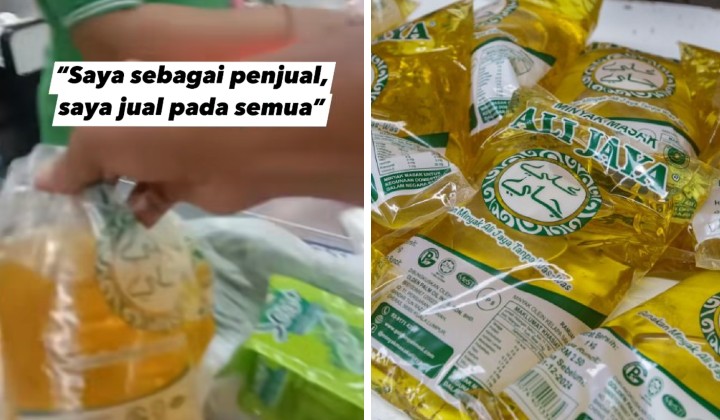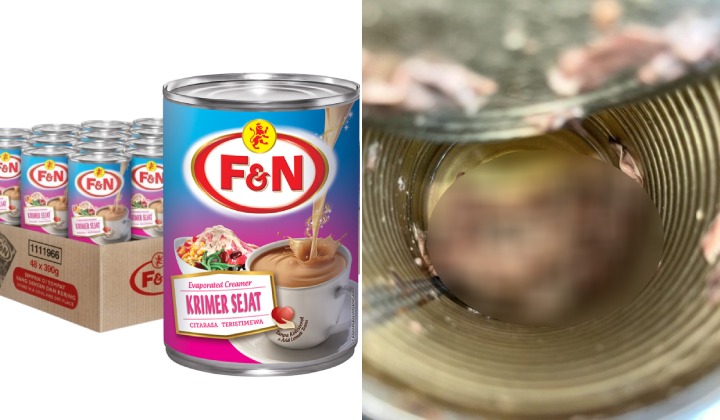[Watch] The Boiling Point: Malaysia’s Subsidized Cooking Oil Dilemma
Allowing foreigners to purchase subsidised cooking oil could increase demand, potentially straining the subsidy program and making it more costly for the government.

Subscribe to our FREE Newsletter, or Telegram and WhatsApp channels for the latest stories and updates.
A recent uproar has emerged over the sale of subsidized cooking oil packets to foreigners, sparking heated debates and confrontations in supermarkets nationwide.
The controversy was ignited further by viral videos and social media posts, including one notable incident at a supermarket where a local confronted staff for allowing foreigners to purchase the subsidized item.
The staff’s response, suggesting that customers can buy what they want, only added fuel to the fire.
Indeed, the frustration regarding the sale of subsidized goods to foreigners has raised concerns among Malaysians.
The authorities, particularly the Ministry of Domestic Trade and Cost of Living (KPDN), are urged to take stringent actions against retailers who sell subsidized items, such as cooking oil, to non-citizens.
The call for legal action against such practices underlines the public’s demand for more robust enforcement of subsidy policies.
This sentiment is echoed across social media and public discourse, where Malaysians express their dismay over what they perceive as a misuse of the subsidies intended to alleviate the cost of living for local citizens.
The expectation is not just for stricter enforcement but also for clear directives from the authorities to prevent such incidents.
@KPDN_HQ buat kerja betul betul la, tadi aku pergi beli barang dekat NSK bersepah orang asing beli minyak paket, apa benda yang korang buat ni?! orang Malaysia yang bayar cukai tau, buat kerja betul betul la!
— Angkuhdanliar (@Angkuhdanliar_) March 9, 2024
The Cooking Oil Conundrum: Balancing Local Needs and Global Realities
Subsidized cooking oil is a staple in Malaysia, intended to alleviate living costs for its citizens.
Specifically, subsidized 1kg of cooking oil is retailed at RM2.50 per kg, reflecting a direct benefit of RM3.50 to RM5.50 or more per kg compared to non-subsidized options.
The quality is generally comparable to branded cooking oils available in the market.
The main difference between subsidized and non-subsidized (branded) cooking oils usually lies in the packaging.
In 2022, the Malaysian government continued to allocate a substantial subsidy for cooking oil, amounting to RM4 billion, covering more than the public requirements of 55,000 metric tonnes per month.
Mmg teruk pun, zaman madani dpt minyak masak harga RM29.70, harga zaman pengikut2 anjing neraka RM42.70.. tu blm cite lg telor hilang, ayam blm lepas kandang💩 pic.twitter.com/KXmiHcHRr2
— Abang aji🪵 (@apanakdikato) March 8, 2024
However, the recent incidents have highlighted a growing tension between the need to support the local population and the reality of an increasingly global community.
There’s an argument for inclusivity and hospitality, especially towards long-term residents or migrant workers who contribute to the Malaysian economy.
Denying them access to necessities at affordable prices could be seen as unfair.
According to Domestic Trade and Cost of Living Minister Datuk Armizan Mohd Ali, foreigners are not restricted from buying subsidized cooking oil packets.
Still, they are subject to the same purchase limits as Malaysians.
Retailers are allowed to limit each customer’s purchase of cooking oil in 1kg polybags to three units per transaction.
KPDN has been at the centre of this storm, conducting inspections and taking action.
For instance, a complaint about NSK Supermarket in Kuala Lumpur selling subsidized cooking oil only to foreigners was investigated and deemed a misunderstanding.
Moreover, action was taken against a shop in Johor Baru that sold subsidized cooking oil to foreigners, highlighting the government’s efforts to address the issue.
Lingering Challenges and Retailer Tactics
Despite these regulations, the issue of subsidized cooking oil remains a persistent problem and is projected to continue into the foreseeable future.
A contributing factor to this ongoing dilemma is the behaviour of some retailers who hide their subsidised cooking oil stock.
This action is often driven by a desire to prioritize sales to certain customers or create an artificial scarcity, which can lead to price manipulation or selling these goods at higher prices than intended.
This tactic not only exacerbates the problem but also undermines the objectives of the subsidy program.
It prevents those in genuine need from accessing affordable cooking oil, thereby intensifying the cost-of-living pressures on the average Malaysian household.
Moreover, it raises ethical concerns about fairness and equality, challenging the principles upon which these subsidies are based.
Adding another layer of complexity is the smuggling of subsidized cooking oil to neighbouring countries.
This illicit activity is driven by significant price disparities between Malaysia and its neighbours.
Subsidized cooking oil in Malaysia is sold much lower than in surrounding countries, making it a lucrative commodity for smugglers.
They exploit these price differences for profit, diverting supplies meant for Malaysian consumers across borders.
Get more stories like this to your inbox by signing up for our newsletter.





